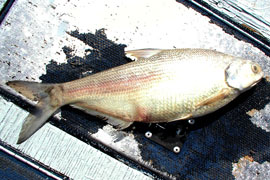Cronkite News has moved to a new home at cronkitenews.azpbs.org. Use this site to search archives from 2011 to May 2015. You can search the new site for current stories.
Golden algae a growing concern in Salt River system
PHOENIX – A one-celled aquatic invader that killed thousands of fish in the Salt River is now a growing concern at Roosevelt Lake.
Dozens of gizzard shad in Roosevelt Lake died late last month from the toxin produced by golden algae, according to the Arizona Game and Fish Department. The toxin damages gills, causing fish to suffocate.
Marc Dahlberg, acting Fisheries Branch chief at Game and Fish, said the algae is a product of drought and prefers water with a higher salt concentration.
“We can’t manipulate what affects golden algae,” Dahlberg said. “We have to hope we have a good spring runoff that will decrease the salinity of the water.”
In July, thousands of fish were found dead in a 20-mile stretch of the Salt River just east of Roosevelt Lake. Five years ago, golden algae was discovered in Saguaro and Apache lakes, also along the Salt River. Officials have used algaecides to control blooms in smaller urban lakes.
The largest of the six Salt River Project lakes, Roosevelt contains many sport fish species including large and smallmouth bass, bluegill and catfish. While Dahlberg said the shad killed in Roosevelt are very sensitive to toxins, the department is worried that if the algae bloom continues other fish will be affected.
“As an angler I’d be worried that it will increase and is going to start affecting species that are sport fish,” Dahlberg said.
Pat Billotte, owner of M&S Marine Boat Repair and Bait and Tackle Shop at Roosevelt Lake, said business has dropped since the dead fish were discovered. A larger fish kill would be devastating, Billotte said.
“My whole livelihood is right here by the lake and has been for over 20 years,” he said.
The first documented case of golden algae, or Prymnesium parvum, in North America occurred in Texas in 1985. Biologists don’t know if it’s native to North America, though it’s considered an invasive species in Arizona.
Gregg Elliott, a principal environmental scientist and engineer for SRP, said algae growth is typical for this time of year and involves only lakes and rivers.
“It’s not affecting the use of water in Valley irrigation or drinking water; it’s more of a recreational issue,” Elliott said.
Matthew Chew, an assistant research professor in Arizona State University’s School of Life Sciences, said golden algae isn’t likely to cause a larger fish kill at Roosevelt Lake.
“My feeling is that conditions in Roosevelt are probably very rarely ideal for the algae,” he said.







